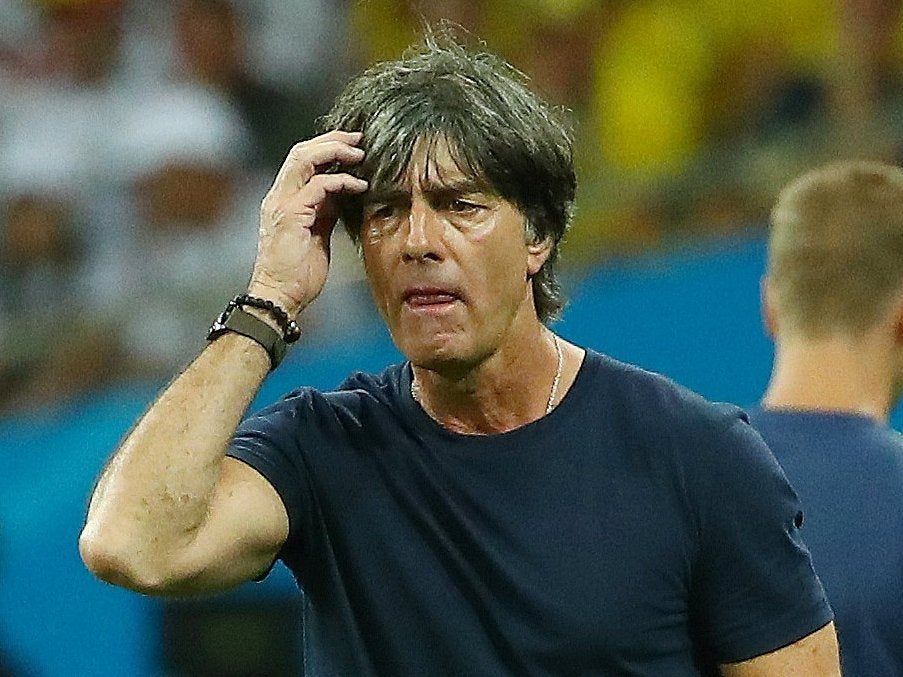World Cup 2018: Germany have been to the brink and back and learnt of their limitations along the way
Joachim Löw's unequivocal confidence last week has disappeared after his side came within a whisker of becoming the third world champions to be knocked out in the group stage
If a language has a word for the joy of misfortune at another person’s expense, you can assume it has a word for most things and in Sochi on Saturday night, at least two members of Germany Football’s World Cup 2018 party certainly appeared keen to remind their Swedish counterparts about the meaning of schadenfreude.
German does not, however, have a word for self-consciousness. The closest relation is selbstbewusstsein, the same as the word for confidence, its opposite. As Raphael Honigstein notes in Das Reboot, his account of the footballing reforms that led to Germany’s triumph in 2014: “[Germans] don’t see the contradiction – to be aware of yourself is to be confident.”
Joachim Löw sounded extremely confident last Sunday, speaking in the aftermath of his side’s surprise opening defeat by Mexico, despite the arrogance, recklessness and naivety his players had shown in that display. Germany crafted enough opportunities to draw that day, as Löw rightly pointed out, but that was irrelevant. They had lost because initially, Juan Carlos Osorio’s side had outclassed them.
Was Löw, then, concerned his side might follow the paths of other recent defending world champions – Italy in 2010 and Spain in 2014 – by seeing their defence of the World Cup end at the group stage? “I have no idea why that was the case with other countries,” he said. “We will not suffer that fate. We will make it to the next round.”
It was a striking, bullish tone for Löw to take, one that could be understood given his side’s pedigree but one that was totally unsupported by their performance. Statisticians downgraded Germany’s chance of progressing from around 90 per cent to 64 per cent after the Mexico defeat – moving Die Mannschaft from almost-certains to mere probables.
Even now, in the immediate hours after Toni Kroos’ spectacular stoppage-time free-kick, Germany’s place in the second round cannot be confidently predicted. Following this victory with another against South Korea on Wednesday in Kazan – back-to-back wins, the best Löw could have asked for last Sunday – may not be enough.
There is the hellish prospect of a three-way tie between Germany, Mexico and Sweden all on six points in Group F. If, for example, both Germany and Sweden win 1-0 on Wednesday then Löw’s side will progress from Group F as winners. If, however, both Germany and Sweden win 2-1, Die Mannschaft will be eliminated, missing out on second place due to Mexico’s superior head-to-head record.
The possibilities and permutations are various and from here, how Wednesday pans out is anyone’s guess. It made sense, then, that while the overriding emotion at the end of the night among players who stopped to speak in the mixed zone was one of relief, there was also talk of the need to improve, and a realisation that the drama of their victory should not mask another performance that often underwhelmed, especially in the first half.

Sweden, an effective but uncomplicated side, found the same space behind the Germany defence as Mexico, despite not having much in the way of speed to exploit it. Janne Andersson complained about the officiating after the final whistle, and while the decisions that went against his side were not so unjust to be an outrage, on another night Sweden could have entered the interval comfortable.
This was not, therefore, a night for the world champions to beat their chest and congratulate themselves, despite those two officials goading the Sweden bench. Löw appeared to understand that too. Asked again about the prospects of playing in the second round, perhaps against Brazil in Samara, he was more diplomatic than last Sunday.
“Right now, it’s not the moment to start ruminating about that,” he said. “There are various possible outcomes in the other groups. We have to play versus South Korea to be sure we make it to the next round.”
Löw is right. There are various possible outcomes, in Brazil’s Group E just as much as Group F. What is certain though is that Germany, having come so near to losing their status as world champions, will not want to find themselves that close to the edge again. If Löw and his players could be accused of over-confidence before and even after last Sunday’s defeat, Mexico and Sweden have made them all too conscious of their limitations now.
Join our commenting forum
Join thought-provoking conversations, follow other Independent readers and see their replies
Comments
Bookmark popover
Removed from bookmarks